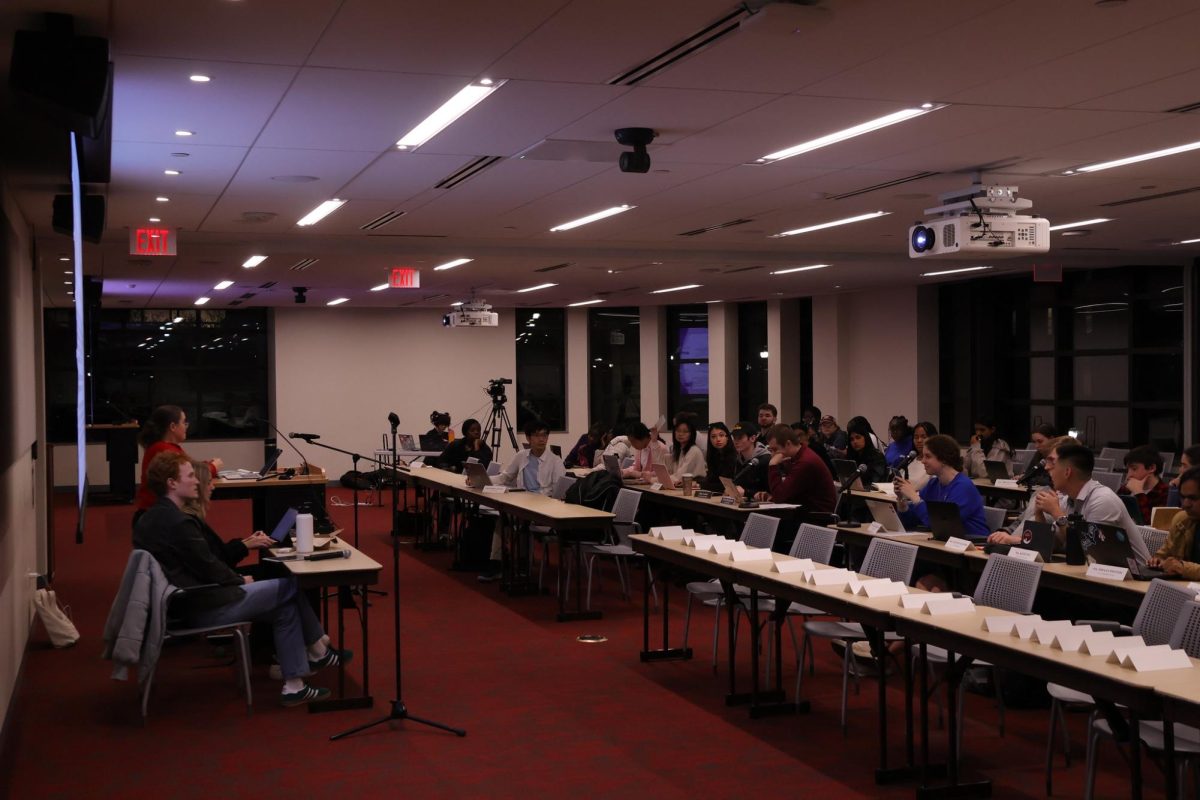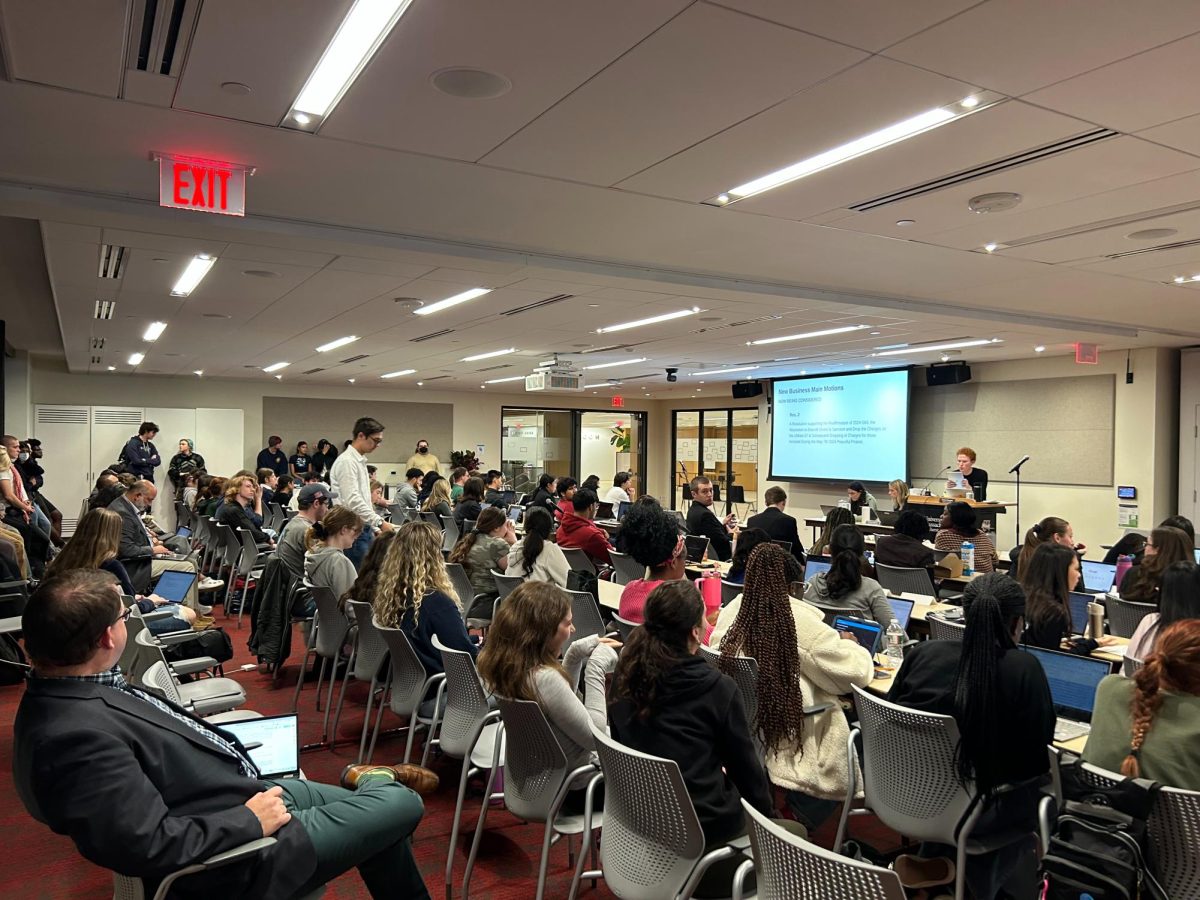On March 2 2023, Title IX Coordinator and Associate Vice Chancellor for Equal Opportunity and Access Kerri Thompson Tillett released an email to all students, staff and faculty at the University of Massachusetts with a review from Comprehensive Investigations and Consulting (CIC).
Back in October 2021, CIC began to “organize and review all reports of sexual misconduct known to be filed with any UMass Amherst office from Sept. 1, 2014 through September 2022, involving sexual assault, stalking, domestic violence, or other gender-based offenses pursuant to Title IX or the Violence Against Women Act,” according to an email by Chancellor Kumble Subbaswamy.
The document includes the Association of American Universities’ survey on sexual assault and misconduct, which states that 13 percent of students and 20 percent of women across 33 schools reported specific forms of sexual violence. The review also highlights the expectations students at UMass and other colleges have for the Title IX office, which includes accountability and transparency in their proceedings and advocacy for survivors during the Title IX process. Students also want for universities to explain their process “in a comprehensive and intelligible way,” after students felt the investigative process was a “lengthy and traumatizing” experience.
CIC interviewed faculty, student groups, administration, employees at the Dean of Students Office, the Student Advisory Task Force, the Athletic Department, survivor advocates, the Equal Opportunity and Access Office (EOA) and law enforcement, which included the chief of UMPD, the chief of the Amherst Police Department, the chief of the Hadley Police Department and the Northwest County District Attorney’s Office. The firm also conducted research on social media sites to understand UMass students’ experiences with the Title IX office.
Three separate sets of statistics were presented in the review. One consisted of incidents reviewed by the Student Conduct and Community Standards Office (SCCS) between 2014 and 2020 and the other consisted of incidents reviewed by the EOA between 2020 and 2022. Lastly, trends and statistics found in the Clery report were also reviewed by CIC.
The review included the percentages on the locations of 37 rape and sexual assault cases reviewed by the SCCS and 63 cases reviewed by the EOA. Residential dorms were found to be the most frequent location of these reported cases, followed by on-campus locations, off-campus housing and lastly, recognized fraternities which accounted for about 3 to 5 percent of reported cases in both reviews.
One hundred and twenty four incidents reviewed by the SCCS and the 114 reviewed by EOA consisted of sexual assault, domestic violence, sexual harassment, rape, stalking, assault and “other.” For both sets of cases, sexual assault was the most frequently reported incident.
In a list of trends, the CIC review found that 86 percent of the 133 rapes reported by the Clery report were on campus, 67 percent being in dorms and 14 percent off campus.
The review also accounted for the University’s handling of reports of sexual violence. The document stated that in 20 percent of the 30 rape and sexual assault cases reviewed by SCCS (from 2014 to 2020) and in 25 percent of the 16 rape and sexual assault cases reviewed by the EOA (from 2020 to 2022), the case was open 6 months after the complaint was filed. It also stated that 59 percent of the 32 cases reviewed by SCCS were resolved by a SCCS hearing, while 100 percent of the 54 cases reviewed by EOA were not resolved by a SCCS/EOA hearing.
Based on this analysis, the review lists steps UMass is currently taking to prevent sexual misconduct.
The University originally promised to conduct the CIC review in a public forum with students and student activists, including the Survivor’s Justice Coalition. Referring to fall 2021 when the public forum was held and protests against sexual violence took place at the Theta Chi fraternity, Tillett said, “At that time, there was a lot of criticism in terms of how sexual assault investigations and complaints were being handled at the University.”
“[The Title IX process] was challenging, it was not supportive, and some adjustments needed to be made so that students could have a better experience with the Title IX Office,” she said. The review was intended to highlight these problem areas and recommend solutions, Tillett added.
“Students wanted to have their concerns validated, it’s hard to evaluate yourself, so I thought it was in our best interest to bring in an outside person to tell us how we’re doing,” she said.
Anna Morel-Paletta is a senior BDIC human rights major and co-founder of the Survivor’s Justice Coalition (SJC), a student-led coalition demanding “justice and better support for survivors at UMass.”
“I feel like there’s not enough information in the report to have an opinion on. I think the only thing that it could maybe help us [with] is that it is [at least] reassuring to read what we have been saying for a while,” Morel-Paletta said, referring to the SJC and other survivor advocacy groups at UMass.
Ava Hawkes, an economics major and also a co-founder of the SJC, said she is appreciative of the University hiring CIC to conduct the review, but the document “basically proves that your reporting system, your communication system—the entire thing—is busted and broken and we could have told you that and we did tell you that,” she said, referring to the public forum administration held with students and survivor advocates which Hawkes attended in the fall of 2021.
In the SJC meeting held in November 2022, Morel-Paletta said she was told to expect the final CIC review before Christmas, but the final date continued to be pushed back to January and finally March. Tillett said she never asked CIC why the process took longer than she anticipated, but assumes it was due to the firm’s “voluminous” pile of documents reporting sexual misconduct over seven years, in combination with their interviews with faculty, staff and students.
The Title IX Student Advisory Task Force
November 2021 saw the creation of the Title IX Student Advisory Task Force. The purpose of the task force is to “have a partnership with students who are passionate about this topic and [to] use them as a sounding board whenever we have concerns or questions about ways to reach the students, but also hearing from our students [the] ways [in which] we can improve their experience around Title IX on campus,” Tillett said.
Hawkes joined the team in the fall 2021 after participating in protests against sexual violence. She organized a “women-led gathering” for students to share their personal experiences with sexual violence and their ideas for reducing sexual violence on campus.
Hawkes said she joined the task force to “be a belligerent actor on [the] advisory board” and express SJC’s demands.
Throughout the fall 2021 semester, the force worked with the SJC and the Student Government Association to implement the Survivor’s Bill of Rights, a document outlining “a comprehensive set of principles and practices that recognize and expand the rights and resources for survivors of gender-based violence.” The Bill lists reporting options for students, protections for survivors, as well as measures the University must follow to ensure the Bill is being effectively implemented. The Bill was passed in December 2021.
Unlike the first group of members who joined after receiving an email from Tillett, membership this year was “not automatic.” Tillett said she, along with Dean of Students Evelyn Ashley, invited three past task force members to continue serving and reached out to different offices and organizations who nominated students to serve on the force. Among these groups were athletics, sorority and fraternity life, SGA, the International Programs Office, the Center for Women and Community as well as representation from the LGBTQ+ community. Currently, there are 11 members, including two representing athletics and three from sorority and fraternity life.
According to Tillett, the renomination aimed to represent a diversity of student voices. “It was never an intent to exclude or alienate anybody, it was an attempt to expand the voices, expand the perspectives on the student group,” she said.
Hawkes said that she was not invited to serve on the second iteration of the task force and was shocked by the inclusion of representatives of Greek Life. “The idea that you would appoint the institution that is at the center of sexual violence on a college campus to be nominating people on the Title IX Task Force was completely absurd,” she said.
During her time on the task force, Hawkes said that she proposed instituting stricter disciplinary guidelines for fraternities if members are accused of sexual violence, including suspension and expulsion, and said the demand was shut down. Tillett said she vaguely recalls a student proposing this in a meeting but doesn’t remember it being “a really pressing point … I also remember our response being that the Dean of Students Office would be the office that could appropriately expel any organization from our campus.”
Referring to demands from students to punish the Theta Chi fraternity in fall 2021, Tillett said, “As I recall, at that time, we had not gotten complaints. People were reluctant or did not file reports with my office anyway, where they were saying that Theta Chi or members of Theta Chi were sexually assaulting people… if we see a pattern, that’s another conversation, but again, these matters are looked at individually.”
Hawkes viewed the inclusion of Greek Life on the task force as an attempt to stop demands from members calling for these stricter disciplinary guidelines for Greek Life. “I think that a lot of those demands that were brought to administration inspired them to make Greek Life one of the nominators of people on the task force, so they wouldn’t have to deal with people bringing up those demands anymore.”
In response to this, Tillett said, “I didn’t see including Greek Life as a way to shut the conversation down. Evelyn and I saw it as including Greek Life to help us help them understand the impression that the campus has of them and find ways to bring more education awareness to the topic.”
This year, the task force focused on educating students, faculty and staff on the Title IX process and resources. For example, the team implemented a new Title IX website. Tillett said the website is more user-friendly and represents the task force’s commitment to improving the transparency of the Title IX process for those who are considering filing a report with the Title IX Office.
Referring to the EOA, which the Title IX office falls under, Tillett said, “The process when [it] comes to EOA shouldn’t be a secret. People should know what to expect before they arrive, so having that information on our website, I hope, makes the process more transparent to those who may need [these] services.”
Starting next year, incoming students will be required to take new Title IX training to register for classes. Tillett said that while the previous training focused on intervention strategies, the new course will explain Title IX policy and resources, as well as how to avoid dangerous situations for sexual violence. The new training aims to ensure students “have a ground-level understanding around behavioral expectations once they arrive on campus,” Tillett said.
The task force also worked with the Faculty Senate to require a Title IX syllabus statement, Tillett said. Starting in the summer, faculty are required to state whether they are a “responsible employee” and list the Title IX resources available to students on their course syllabi. A responsible employee refers to faculty and staff at UMass who are required to report any potential situations of sexual misconduct, sexual assault, relationship violence, stalking or other assault and harassment involving another UMass student or employee.
Among these responsible employees are faculty in administrative or supervisory positions, academic advisors, coaches and trainers, RSO advisors, resident assistants and certain Student Affairs and Campus Life employees. According to William Calvin Tompkins, a senior BDIC and political science major and a member of SGA and the Title IX Task Force, the task force pushed to make it known for students when they are speaking to a mandated reporter.
Title IX Training Specialist
As part of their commitment to expanding Title IX education, the University hired Jules Purnell to serve as the Title IX training specialist last June. According to Tillett, there was previously not a specific resource dedicated to Title IX education within the EOA office — Jules Purnell was onboarded to fill this gap.
“A lot of my first year is really getting accustomed to what is community need, what are some pieces that are missing on this campus,” Purnell said. They see their role as “figuring out what’s the best way to reach people on this campus that is so big and diffused” and educate them on the Title IX process and sexual violence prevention.
During last year’s orientation, Purnell worked with the Not Ready for Bedtime Players, a UMass student group dedicated to peer education on sexuality, to create a “conversation on the intersection between consent and substances of use, whether that is cannabis, alcohol, things like that, and how that impacts consent,” Purnell added.
They also tabled at the student union in April, Sexual Assault Awareness Month, and encouraged visitors to answer the question, “Why does Sexual Assault Awareness Month matter to you?” on a whiteboard. Purnell then posted a picture on the UMass Title IX Instagram page. They hope to continue growing the social media’s following to reach more students.
Purnell has also reached out to student groups and organizations on campus to expand Title IX education beyond orientation. For example, they sent a video in April explaining Title IX rights and resources and asking five to 10 questions as a knowledge check quiz at the end. Purnell also said they have met with almost every athletics team and conducted a 45-minute conversation followed by a quick Kahoot quiz on various topics, including Title IX policies, how to access Title IX resources and the reporting process.
Purnell said they had talked to over 700 people so far. “It’s a drop in the bucket compared to the 30,000 students on this campus, but it’s something.”
Purnell and Tillett said they worked with the task force to determine the best ways to reach students. “UMass is incredibly siloed, so again, [we’re] trying to find ways where we can offer these services so that our students are exposed to Title IX training beyond the first year,” Purnell explained.
Purnell also implemented a “restorative justice” option for students and faculty who file a report to the Title IX office and prefer an alternative to the traditional process, which involves an investigation and often a hearing and cross-examination which can be intimidating and lengthy. Instead, the restorative justice option is a “facilitated conversation” with Purnell, the complainant and the respondent.
First, Purnell meets with the complainant and respondent separately, records their stories and asks “What would satisfaction look like and how can we get close to that?” They then express this to the other party and the two agree on how to move forward before signing an acknowledgement that the matter has been resolved. Purnell said the majority of conclusions involve an apology and a promise to never repeat the action from the respondent. “It can look like so many things,” Purnell explained. “I always want there to be agreement, I don’t want someone to feel like they’re being strong rimmed into something.”
Purnell said this agreement is possible because they found that the complainants and respondents who agree to the restorative justice option show a commitment to addressing the issue with an open mind and moving forward. “What I have found in most cases is that people genuinely want to be in right relationship, they want to be in good community with people,” Purnell said.
Next Steps
New positions
The review described five “areas of improvement” for the University’s handling of sexual misconduct, including the time frame of the Title IX process and the number of hearings for reports, communication between the Title IX Office and the complainant and respondent, the appointment and training of personnel within the Title IX space, “a bottleneck preventing decisions from being executed” and the campus climate.
At the end, the investigative firm outlined seven recommendations for the University to address these obstacles. First, CIC advised that the EOA should conduct hearings for “any and all cases in which a hearing was previously scheduled.” The firm also advised that cases in which a complaint was filed before September should be resolved by the end of the semester in December 2022 and any remaining cases should be referred to SCCS.
The second recommendation asked the University to follow specific time frames specified by EOA policy and to only allow extensions for “good and necessary reasons.” CIC stated that “any case in which an official complaint is/was made 60 days before the end of semester should be resolved within that semester” and “any case in which an official complaint is/was made within 60 days after the semester ended should be resolved within the following semester.”
The third recommendation states that the University should provide a form to a complainant in which they choose whether or not they may be contacted by phone and the University should update the complainant on the state of their case, including why the case is being continued longer than initially expected, explain their rights at each point of the case and never allow 30 days to pass without communication with the complainant.
The fourth, fifth and sixth recommendations advise the University to hire and train more individuals within the Title IX space, advising the EOA to train students to serve as advisors and individuals to serve as board members for hearings before the start of the next academic year. The CIC also recommended that the EOA hire a supervisory investigator dedicated solely to investigations, two full-time intake coordinators and two part-time intake coordinators.
According to Tillett, within the Title IX Office, there are currently three investigators of Title IX cases, one full-time intake coordinator and one part-time intake coordinator. The intake coordinators are “the first point of contact whenever a student wants to file a complaint.” Tillett says intake helps provide the individual with immediate support. To execute the review’s recommendations, Tillett said the EOA is taking steps to fill the position of a director of investigations. She also said the EOA is in the process of hiring another full-time intake coordinator.
The EOA is planning to train more hearing advisors as well to resolve the current shortage. Hearing advisors provide one-on-one support for complainants and respondents during the hearing process and assist with cross-examining witnesses.
Tillett said, “It helps to take some of the pressure off of the complainant who may not want to feel like they are reliving the process by having to be in control at the hearing process. You have someone who is sitting there with you who is going to cross-examine the witnesses, who is maybe going to influence the questioning such that the hearing panel will be able to the appreciate the experience that the victim may have had during a sexual assault… It’s set up so that people aren’t part of the process alone.”
These new positions will shorten the timeline for hearings involving sexual misconduct by assigning particular responsibilities to particular roles and streamlining the Title IX reporting process, Tillett explained. “Now, the intake is keeping the students informed about the process of their investigation, they are making sure the students have what they need in terms of resources and support, so that all the investigator has to do is investigate.”
Expanding Education
CIC’s last recommendation advised the University to establish training programs which follow “M.G.L. c.6 sec. 168E,” the Massachusetts state law requiring all higher-education institutions to “provide more training, provide better resources to be more transparent as they are managing Title IX work on this campus,” according to Tillett. The review said the University should require this training every year, although this recommendation exceeds the law’s expectations.
After working with the Title IX Student Task Force to hear student input, Purnell is working on an online training program for sophomore students, graduate students, and leaders of student groups. They said that the training is “self-paced, gamified” and will present situations involving bystander intervention and survivor support before providing options for participants to choose how to react. “I wanted something that was a bit more engaging and would actually get students to focus,” they explained. Purnell and the task force are still figuring out the details and the timeline of its implementation.
To continue reaching out to more students past their orientation, Purnell is also planning to organize “a conversation with and guided by survivors who are part of the LGBTQ+ community, specifically survivors of intimate partner violence because that isn’t a conversation that is often included in broader prevention strategies.” They believe this conversation is important because intimate partner violence is often discussed through a “cis-het lens” and “thinking about it in this one particular way does a disservice to everyone involved.”
They also plan to reach out to Residential Life Services about providing brief Title IX training at biweekly floor meetings and hopes to conduct more informational tabling along convenience paths on campus. Referring to their work and the task force’s work regarding education, Purnell said, “We’re still figuring out the best way to meet students where they’re at and to make sure that it’s not just the students that already care about this, because that’s the other issue: we want to try to get in front of students who would not get this education otherwise.”
Aalianna Marietta can be reached at [email protected].







